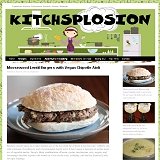
Here’s a college story I used to love to tell:
Leaving the classroom after my final exam for one of my English classes, I spotted my professor down the hallway bowed in front of a vending machine, opening what looked like a school lunch milk carton. That made sense because Cornell’s Agricultural School provided milk in our vending machines. I headed towards the exit, towards my professor, thinking nothing of the scene as he tipped the carton back. Suddenly, rather than swallowing, he was pouring the drink down his shirt. I might have pretended I didn’t see it happen, except by this time I was in speaking distance and he was between me and outside.
He looked up at me and said, “It was orange juice…I thought I was getting milk…you know that moment….when you’re in between paradigms…? When all you can do is…experience?”
In my memory, he says it in a slow stoner deep-thought voice, but this could just be my imagination after a classmate told me she’d walked into a cloud of pot smoke in his office.
Back then, the punch line to this story meant to me one of these: Cornell professors say deep things when they are stoned; Cornell professors say deep-sounding things while they are stoned; or deep thinking Cornell professors get stoned.
Now I can’t help thinking about that “between paradigms and just experience” moment and why I want to spend some time there.
Imagine you are inhabiting a milk drinking paradigm. You tilt your head back with particular but unexamined expectations about the texture, smell, taste of what you are about to drink. However, instead of creamy smooth milk, a pulpy liquid pours onto your tongue; instead of slightly sweet dairy, your nose and taste buds detect fruity sweet and sour. Imagine the confusion of unexpected taste, smell, and tongue-feel. In that moment you sense not the familiar milk, but for just a tiny nano-moment, neither do you experience orange juice. You are jarred you out of the milk paradigm and for an instant, you exist outside of a beverage paradigm.
What is this not-milk? you will ask yourself momentarily.
But before you can make sense of it and label the experience as “orange juice”, before you can even ask the question, you are in a realm of pure sensation.
The professor was right: between paradigms—without expectation or understanding—you can only experience. You taste, smell, touch, see, perhaps even hear. You may observe pulpy, sour, sweet, orange color. Yet there are no words for these feelings and observations. Just the undigested pure sensations themselves.
You don’t stay between paradigms in the world of visceral experience long, however. Your sense-making paradigm-following brain must make sense of these wrong not-milk sensations. It creates labels. “Oh, it’s orange juice!” And you arrive at a comfortably explainable new paradigm. Then, perhaps, recognition of your student witnessing you pouring orange juice down your shirt. And you come up with a verbal explanation for said student.
The magic is over. What magic, you ask? I am reminded by e.e.cummings poem which begins,
since feeling is first/who pays any attention/ to the syntax of things/ will never wholly kiss you;
The idea that words get in the way of truly experiencing the world is echoed by Osteopath Bonnie Gintis. She writes, “the desire to label an experience or sensation as it is occurring limits it.” (51)
As I read her chapter for my craniosacral therapy class, I keep wanting to ask Gintis, “Yes! but How?” On a usual morning when I meditate through my swim, I now realize I have been (all this time!) narrating what I intend to do and how I am feeling. In Engaging the Movement of Life: Exploring Health and Embodiment through Osteopathy and Continnum, Gintis writes, “The ability to be in the experience without commentary allows for an infinite interweaving of possibilities….it is impossible to be simultaneously in the realm of language and be open to new experiences for which words might not exist.” Cummings writes, “life is not a paragraph” and indeed, should we not live unbounded by syntax? But how does one escape the realm of words into pure experience?
I tried this morning to experience pure sensation of swimming without words. At first it was like trying to meditate by telling myself, stop thinking stop thinking stop thinking. Feelings came, alright; Bouyancy! Cool and warm, bubbles, movement. But every one had its associated words. How does one evade the blasted internal monologue?
Gintis suggests one answer is in the difference between paying attention versus concentrating. Paying attention, she says, is more diffuse, a softened gaze that takes in the “space around the thing to which we are attending.”
I hadn’t gotten to that part of the chapter before I swam, however. The answer I came to was the same answer given to students of meditation who think they are supposed to turn off their thoughts. They are often told: instead, place your attention on the breath. Thoughts will arise inevitably, but you can let them go and return to the breath. Over and over again. So I tried an analogous method. In this case, letting go of labels and returning to sensation over and over again. What do I feel now? In practice this might be similar to the soft gaze, the release of concentration and opening of attention.
I had some truly cool moments during my swim. But how to reconcile: I am a writer. Later, I promised myself, I will allow the words to flow back in. And here they are. Even ee cummings used words to expresses his desire to experience his love without words.






